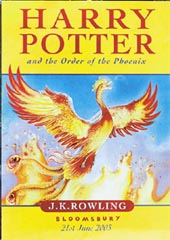 |
| Help, Harry! |
London, Oct. 5 (Reuters): Even as readers devour the code-cracking thriller The Da Vinci Code and best-selling Iraq War titles, the book trade faces damaging threats from a boom in video games, deeper discounting and online sales of used books.
On the eve of the Frankfurt Book Fair, the world?s biggest annual industry event, publishing houses say these trends coupled with an ailing global economy and no new Harry Potter blockbuster have them struggling to grow at the rate of inflation this year.
The book business is getting hit on both ends: as popular new releases sell for less at discount retailers, brisker trade on websites such as Amazon and Abebooks cuts into sales of the usually reliable and profitable backlist.
?Publishers and retailers need to take a close look at their pricing and discounting structures to ensure that they can compete with the growing used book segment and the shrinking margins on hardcover titles,? Barrie Rappaport, chief analyst at US market research firm Ipsos BookTrends, said.
But publishers admit that their success hinges on what it always has: finding good authors and good books, which is why they descend on Frankfurt by the thousands, in search of the next J.K. Rowling.
?It?s about keeping your finger on the pulse of the public,? Patricia Schroeder, president of the US publishing industry?s trade association said. ?The pulse is also very hard to monitor because of the diversity of readers and what they want to read.?
This year the fair will highlight Arabic literature in a bid to build bridges against the backdrop of the September 11 attacks on the US and the subsequent conflict.
The theme could have particular resonance this year as one participant, Ali Ahmed Said, the Syrian-Lebanese poet known as Adonis, is being tipped as a possible winner of Thursday?s Nobel prize for literature.
Though the fair serves as a marketplace to buy and sell international rights for books, a key topic of conversation will no doubt be falling book prices. Ipsos data show that American consumers, who represent one-third of the $55-billion global consumer book market, spent on average $22.75 for a new hardcover title last year, or 4.1 per cent less than they did in 1998.
Similar figures from the British trade magazine Bookseller, reveal that a typical hardback novel last year cost ?12 ($21.42) compared with ?13.50 in 2000.
Elsewhere, deeper discounts at supermarkets and other non-bookstore retailers have fuelled sales of such titles as management bestseller Who Moved My Cheese? and mystery novel The Curious Incident of the Dog in the Night-Time and in many cases forced bookstores to chop their prices.
?In the end, it can?t be good news for an industry if year after year after year, the price you can sell your premium product for keeps getting lower and lower,? said Helen Fraser, managing director of Penguin UK. More and more recently released books also are available for sale online at used book rates and consumers are increasingly clearing their bookshelves onto eBay and Amazon.
And though children?s book sales are on the rise, publishers fear that stockings will be stuffed with more video games, iPods and DVDs rather than a Lemony Snicket or Philip Pullman title.











